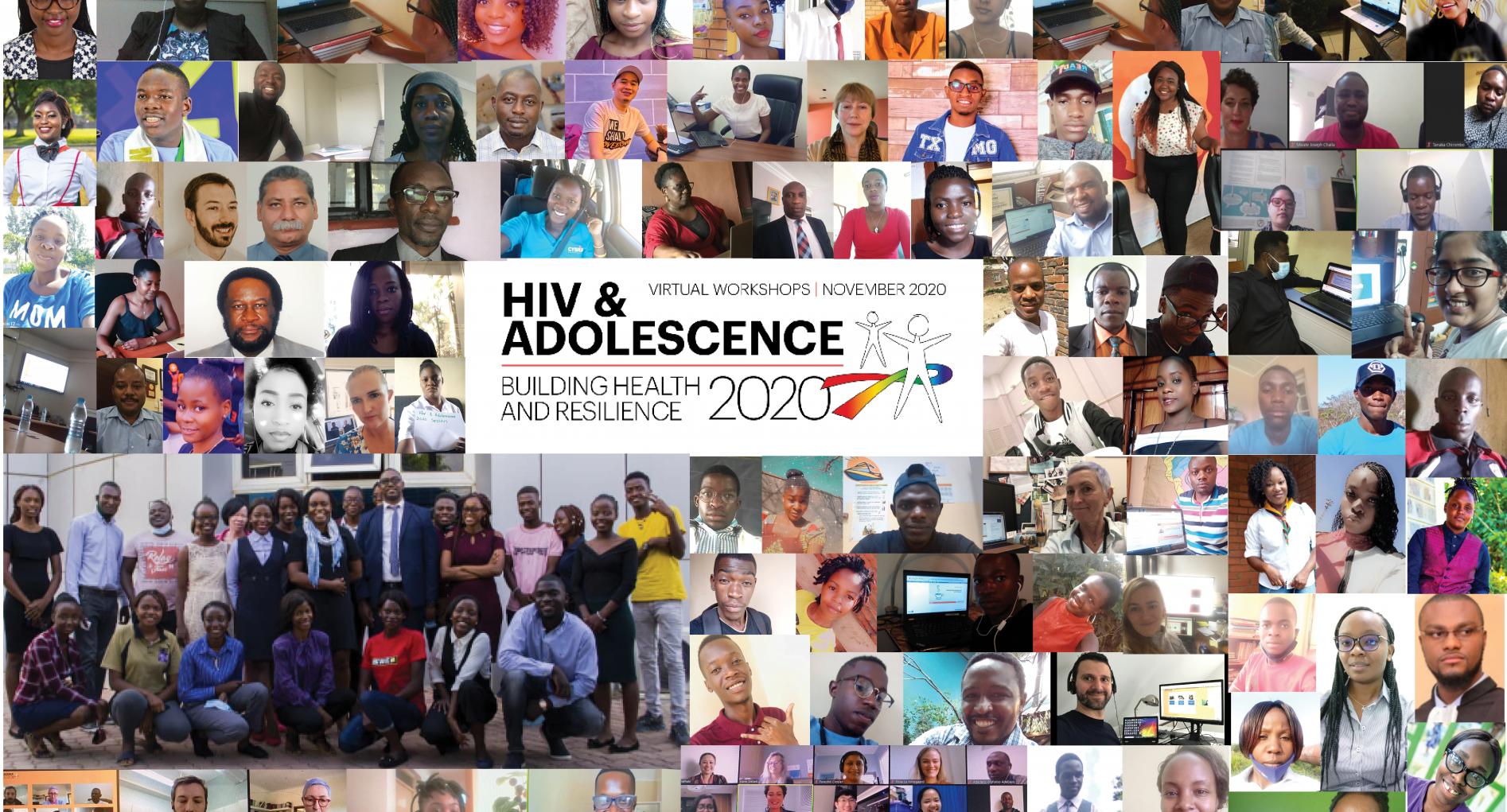The International Workshop on HIV & Adolescence 2020 took place as a series of virtual sessions during the month of November. The fourth and final week of the workshop featured sessions on mental health, new technologies, and participatory research.
Read the complete session summaries below and join us again in Zambia next year!
Workshop Highlights From Week 4 | HIV & Adolescence 2020

Highlights from Week 4
The Quest for Well-being: Adolescents and Mental Health
This session shed light on results from some of the emerging interventions to address the existing gap in mental health programming. Drawing on her own experience, Cindy Amaiza from Y+ Kenya explained that adolescents and young people living with HIV (AYPLHIV) face an elevated risk of mental health challenges due to stigmatization and the side effects of ARVs. She recommended to integrate and prioritize community-based, peer-led mental health interventions in the HIV package of care.
Trained and mentored Community Adolescent Treatment Supporters (CATS) are well placed to provide trusted and empathetic support to their peers. Nicola Willis, Africaid shared findings from a new trial in Zimbabwe showing that combining standard CATS support with problem-solving therapy decreased the prevalence of common mental disorder symptoms among AYPLHIV from 68 to two per cent.
Monika Kamkuemah, University of Cape Town presented research showing that community violence, substance use and poor parental monitoring and supervision may increase vulnerability to mental health disorders, expressed by high levels of depressive symptoms among AYPLHIV residing in townships in Cape Town. She stressed that recreational options can help interrupt pathways that predispose youth to engage in harmful behaviours.
The COVID-19 pandemic has made it difficult for vulnerable young mothers to access critical health services, including psychosocial support, creating increased levels of psychological distress. Sharifah Nalugo, Pediatric-Adolescents Treatment Africa (PATA) and Joint Clinical Research Center (JCRC) presented the smartphone application ABCD (Ask, Boost, Connect, Discuss), which is providing peer supporters in Uganda with tools to deliver psycho-social support to young pregnant women and mothers telephonically. Peer supporters have been intricately involved in content development and feedback to reach young women during periods of movement restriction.
The Best Research is Research with Us and by Us - Participatory Research Practices
This session discussed key issues and strategies for capacity building of adolescents and young people to participate in research that concerns them. Keynote speaker Abigail Solomons from Positive Vibes Trust, Namibia deliberated what active youth participation in research looks like, and why it is important to facilitate trust and ensure that data are representative of diversity and translate into nuanced and equitable solutions.
Chelsea Coakley, Grassroots Soccer shared lessons learned from an adolescent girl-led participatory action research project on comprehensive sexuality education in Cape Town, South Africa. Training youth investigators to conduct research to improve their lives – complemented more traditional data to capture more authentic data and adolescent voices.
Dr. Clarence Yah, WITS RHI shared experiences from the GAP Year cluster randomized trial on using an SMS messaging platform during the COVID-19 pandemic to share safety tips, prevention messaging, linkages to services and check in on study participants’ wellbeing. The SMS platform proved to be a good alternative to reach study participants in South Africa early and often during the pandemic.
Harley Edwards, Desmond Tutu Health Foundation discussed issues related to capacity building to enhance adolescent participation in research. Approaches implemented by the foundation include online e-fellowships, an adolescent research toolkit and a short course on adolescent and youth health policy. COVID-19 adaptations have brought the potential to expand opportunities even further through a virtual world, however it was learned that flexibility and choosing the right online platforms are key to success.
Innovative Approaches for GenZ
Reaching Generation Z with interventions means innovating in service delivery and programming to develop new ways of doing business, from m-health, multi-media and interactive approaches to incentivised services and multidisciplinary interventions. Doan Thanh Tung from Lighthouse Social Enterprise shared experiences of working with and providing services to young key populations through information and communication technology in Viet Nam. He provided tips on what appeals to young people, leveraging big data, social media and multiple channels.
Mamakiri Mulaudzi, University of the Witwatersrand presented a study that aimed to develop a self-administered HIV risk calculator through a collaborative and user-driven process with young people living in Soweto, South Africa. Participants underlined their preference for an interactive and informational online risk assessment, which allows them to openly ask questions about their health. Privacy and confidentiality are important features that may promote acceptability of online HIV prevention methods.
Dr. Ibrahima Mamby Keita, Senegal Ministry Of Health And Social Action shared findings from an evaluation of a strategy to create multi-disciplinary mobile HIV care teams in collaboration with community actors to strengthen care in disadvantaged and hard-to-reach areas. 90 per cent of staff consisted of community representatives. The strategy boosted coverage across the HIV cascade in the intervention district. HIV testing increased by 10 per cent and the proportion of newly diagnosed people living with HIV initiated on ART increased from 73 to 94 over one year.
Dr. Maureen Anetoh, Nnamdi Azikiwe University presented an impact evaluation of a one-year structured adherence support incentive scheme on HIV outcomes in 246 adolescents living with HIV in Anambra State, Nigeria. The incentive scheme offering conditional economic incentives and motivational interviewing on achieving HIV treatment outcomes was found to increase the number of adolescents having an undetectable viral load by 10 per cent over 12 months.

In Partnership with UNICEF
The Children and AIDS Learning Collaborative connects stakeholders around the world on HIV and AIDS topics related to children, adolescents and pregnant women. Led by UNICEF, the community shares the latest research, publications, webinars and learning activities through email updates and on www.childrenandaids.org.
Contact Information
- For more information about the HIV & Adolescence Workshop and registration, please contact Rikke Rode at rikke.rode@vironet.com
- For questions or comments on this post, please contact Rikke Le Kirkegaard at rlekirkegaard@unicef.org
- Get in touch with the communications department at communications@amededu.com